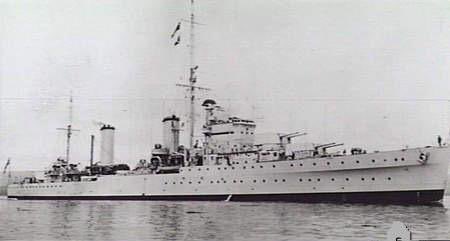80 yrs ago tonight, my predecessor, Sir Ronald Campbell, was in Bordeaux with a skeleton staff and the French Govt, when  https://abs.twimg.com/emoji/v2/... draggable="false" alt="🇫🇷" title="Flagge von Frankreich" aria-label="Emoji: Flagge von Frankreich"> surrendered just after 6pm. He and his colleagues decided to leave that night to head to Arcachon to rendez-vous with a British warship awaiting them...
https://abs.twimg.com/emoji/v2/... draggable="false" alt="🇫🇷" title="Flagge von Frankreich" aria-label="Emoji: Flagge von Frankreich"> surrendered just after 6pm. He and his colleagues decided to leave that night to head to Arcachon to rendez-vous with a British warship awaiting them...
The Ambassador went to bid farewell to Petain but found him in bed. His deputy recorded that they left at 11pm, taking the Canadian and South African Ministers with them, arriving at Arcachon around midnight.
Just after 0600 on 23 June 1940, they embarked on an open sardine boat...with suitcases and official boxes... and made their way down the lagoon to the open sea. As his deputy, Oliver Harvey, recorded in his diary: ‘It was very rough and soon began to rain...’
‘...But when we reached the open sea, the  https://abs.twimg.com/emoji/v2/... draggable="false" alt="🇬🇧" title="Flagge des Vereinigten Königreiches" aria-label="Emoji: Flagge des Vereinigten Königreiches"> cruiser [HMS Galatea] was nowhere to be seen....Time went on and our position was really rather parlous...exposed as we were to submarine or air attack...’
https://abs.twimg.com/emoji/v2/... draggable="false" alt="🇬🇧" title="Flagge des Vereinigten Königreiches" aria-label="Emoji: Flagge des Vereinigten Königreiches"> cruiser [HMS Galatea] was nowhere to be seen....Time went on and our position was really rather parlous...exposed as we were to submarine or air attack...’
The Naval Attaché ‘had a portable wireless set, which eventually got the Galatea but she didn’t say where she was and only told us to wait...’ Eventually a  https://abs.twimg.com/emoji/v2/... draggable="false" alt="🇨🇦" title="Flagge von Kanada" aria-label="Emoji: Flagge von Kanada"> destroyer appeared and they were told to embark on her, which they did with great difficulty, as the sea was very heavy.
https://abs.twimg.com/emoji/v2/... draggable="false" alt="🇨🇦" title="Flagge von Kanada" aria-label="Emoji: Flagge von Kanada"> destroyer appeared and they were told to embark on her, which they did with great difficulty, as the sea was very heavy.
The destroyer took them to St Jean de Luz, where they transferred to the cruiser HMS Galatea - which set sail at midnight for  https://abs.twimg.com/emoji/v2/... draggable="false" alt="🇬🇧" title="Flagge des Vereinigten Königreiches" aria-label="Emoji: Flagge des Vereinigten Königreiches"> at full speed, as an enemy submarine was reported to be in the area. The Ambassador arrived at Plymouth at 9pm, after a rough but uneventful crossing.
https://abs.twimg.com/emoji/v2/... draggable="false" alt="🇬🇧" title="Flagge des Vereinigten Königreiches" aria-label="Emoji: Flagge des Vereinigten Königreiches"> at full speed, as an enemy submarine was reported to be in the area. The Ambassador arrived at Plymouth at 9pm, after a rough but uneventful crossing.
It would be another 4 years until the British Embassy in Paris re-opened under a new Ambassador, Duff Cooper, on 13 September 1944 - shortly after the Liberation of Paris. On the evening of 22 June 1940, de Gaulle made his second speech over the BBC from London, urging resistance

 Read on Twitter
Read on Twitter surrendered just after 6pm. He and his colleagues decided to leave that night to head to Arcachon to rendez-vous with a British warship awaiting them..." title="80 yrs ago tonight, my predecessor, Sir Ronald Campbell, was in Bordeaux with a skeleton staff and the French Govt, when https://abs.twimg.com/emoji/v2/... draggable="false" alt="🇫🇷" title="Flagge von Frankreich" aria-label="Emoji: Flagge von Frankreich"> surrendered just after 6pm. He and his colleagues decided to leave that night to head to Arcachon to rendez-vous with a British warship awaiting them..." class="img-responsive" style="max-width:100%;"/>
surrendered just after 6pm. He and his colleagues decided to leave that night to head to Arcachon to rendez-vous with a British warship awaiting them..." title="80 yrs ago tonight, my predecessor, Sir Ronald Campbell, was in Bordeaux with a skeleton staff and the French Govt, when https://abs.twimg.com/emoji/v2/... draggable="false" alt="🇫🇷" title="Flagge von Frankreich" aria-label="Emoji: Flagge von Frankreich"> surrendered just after 6pm. He and his colleagues decided to leave that night to head to Arcachon to rendez-vous with a British warship awaiting them..." class="img-responsive" style="max-width:100%;"/>


